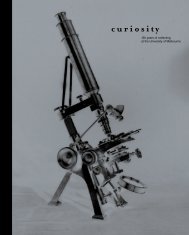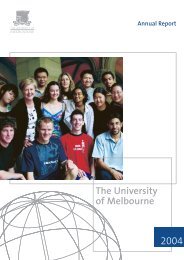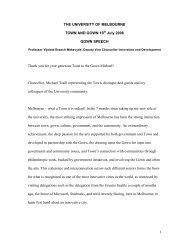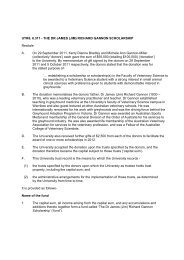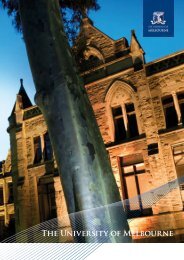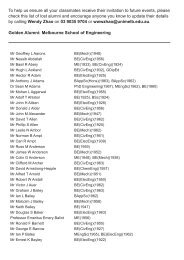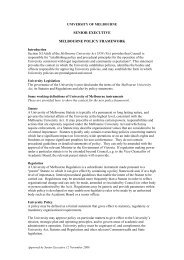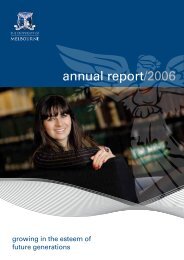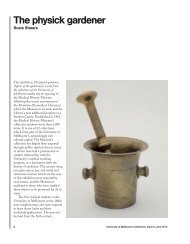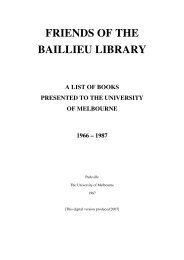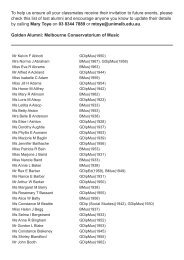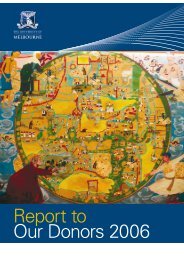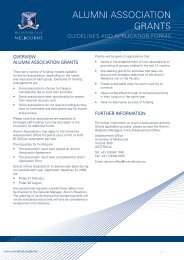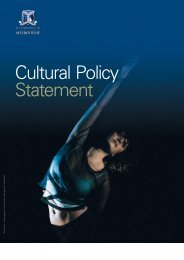2010 International Undergraduate Prospectus nts. u.au
2010 International Undergraduate Prospectus nts. u.au
2010 International Undergraduate Prospectus nts. u.au
You also want an ePaper? Increase the reach of your titles
YUMPU automatically turns print PDFs into web optimized ePapers that Google loves.
Interdisciplinary approach: The New<br />
Generation undergraduate degrees will<br />
provide a sound major discipline base<br />
while exposing stude<strong>nts</strong> to a greater<br />
breadth of knowledge across disciplines.<br />
Graduates of these degrees will have<br />
generic and interdisciplinary skills suitable<br />
for postgraduate programs and diverse and<br />
changing workplaces.<br />
<strong>International</strong> alignment: The Melbourne<br />
Model (see pages 8–9 and 78–79) aligns<br />
with the best of European and Asian<br />
education practice and North American<br />
‘liberal education’ traditions.<br />
<strong>International</strong> Baccal<strong>au</strong>reate: An<br />
internationally recognised high school<br />
diploma leading to university study.<br />
<strong>International</strong> student: At the University<br />
of Melbourne, an international student<br />
is any student who is not an Australian<br />
or New Zealand citizen, or who is not an<br />
Australian permanent resident or holder of a<br />
permanent Humanitarian Visa.<br />
k<br />
Knowledge transfer: In relation to the<br />
Melbourne Model (see pages 8–9 and<br />
78–79), the New Generation of<br />
undergraduate degrees will have a greater<br />
emphasis on engagement with industry and<br />
the community and additional opportunities<br />
for international experiences.<br />
l<br />
Lecture: Large formal classes in which<br />
lecturers present course material to all<br />
stude<strong>nts</strong> enrolled in a given subject.<br />
(Compare with ‘tutorial’.)<br />
m<br />
Major: A sequence of subjects undertaken<br />
within an undergraduate degree that, when<br />
put together, form a specialisation in a<br />
certain area of study.<br />
Melbourne Model: See pages 8–9 and<br />
78–79.<br />
n<br />
New Generation undergraduate<br />
degree: The six undergraduate degrees<br />
introduced in 2008 under the Melbourne<br />
Model are: Arts, Biomedicine, Commerce,<br />
Environme<strong>nts</strong>, Music and Science.<br />
These three-year undergraduate degrees<br />
are focused broadly on the Arts and<br />
the Sciences and offer pathways into<br />
employment, professional graduate<br />
programs or research higher degrees.<br />
The New Generation undergraduate<br />
degrees aim to produce graduates who<br />
are academically excellent, knowledgeable<br />
across disciplines, leaders in professions<br />
and communities, fluent between cultures,<br />
and active global citizens.<br />
Nobel l<strong>au</strong>reates: Winners of the Nobel<br />
Prize, the world’s most prestigious research<br />
award.<br />
Non-teaching period: Period of time<br />
during the university semester when there<br />
are no classes.<br />
o<br />
Online education: Web-based or internetbased<br />
education.<br />
OSHC Overseas Student Health Cover:<br />
Compulsory health insurance which<br />
international stude<strong>nts</strong> must hold for the<br />
full duration of their course to meet the<br />
requireme<strong>nts</strong> of their student visa.<br />
p<br />
Permanent residency (PR): If an<br />
international student obtains Australian PR<br />
status either before commencing or while<br />
enrolled at the University, they must notify<br />
the University immediately, as they cease to<br />
be an international student and become an<br />
Australian student.<br />
Postgraduate degree/course: See<br />
graduate degree/course.<br />
Prerequisite: Subjects that must be<br />
completed before commencing a particular<br />
course.<br />
r<br />
Research exposure: As is currently the<br />
case, stude<strong>nts</strong> in the New Generation<br />
undergraduate degrees will experience<br />
research-led teaching, with the opportunity<br />
to work with and be inspired by the world’s<br />
top researchers. Opportunities will also<br />
be developed for stude<strong>nts</strong> to undertake<br />
a research project in the final year of their<br />
degrees.<br />
s<br />
Selection: A process by which the<br />
University makes a decision regarding the<br />
outcome of an application for entry to the<br />
University.<br />
Sequential degrees: Two undergraduate<br />
degrees completed one after the other. You<br />
may be able to complete two three-year<br />
undergraduate degrees in five years (same<br />
period as in the current double degree) if<br />
you are eligible for cross-credit.<br />
Specialisation: See major.<br />
Student centre: An integrated one-stop<br />
shop for wide-ranging student services that<br />
provides a safe and secure setting for either<br />
group or individual learning with access<br />
to collaborative, social learning spaces<br />
supported by a flexible IT environment.<br />
t<br />
Teaching methodologies: Varied methods<br />
of teaching to assist you in achieving the<br />
best learning outcomes.<br />
TOEFL (Test of English as a Foreign<br />
Language): An international English<br />
language test recognised by the<br />
University as meeting its English language<br />
requireme<strong>nts</strong>.<br />
Transition program: The Transition<br />
program, including Orientation programs,<br />
assists first-year stude<strong>nts</strong> in adjusting to<br />
life at university and contributes to the<br />
enhancement of academic and life skills<br />
development through targeted programs in<br />
association with faculties and service units.<br />
Tutorial (‘tute’): Small classes in which<br />
material from lectures and readings can be<br />
discussed in detail. (Compare with ‘lecture’<br />
above.)<br />
Typical course fee: Typical course fees<br />
have been calculated to give future stude<strong>nts</strong><br />
an idea of likely tuition fees. These fees are<br />
based on the current discipline fee bands<br />
and average enrolme<strong>nts</strong> of past stude<strong>nts</strong><br />
in that course. Actual tuition fees payable<br />
are based on the particular subjects you<br />
choose to study.<br />
u<br />
<strong>Undergraduate</strong> degree/course: A first<br />
course at university. Courses vary in length.<br />
At the University of Melbourne, courses<br />
defined as undergraduate include bachelors<br />
degrees, bachelors degrees (honours),<br />
advanced diplomas and concurrent<br />
diplomas.<br />
139



